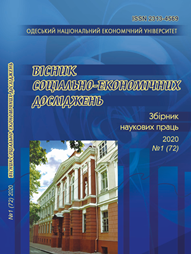Investigation of clusterization process features of tourism sector of Europe
DOI:
https://doi.org/10.33987/vsed.1(72).2020.43-56Keywords:
clusters, tourism clusters, tourism business, clustering process, European Cluster Collaboration PlatformAbstract
The article investigations the European experience of the clustering process in general and the organization of tourism clusters in particular. It is noted that in the conditions of globalization, clusters have become a consolidating force, which helps achieve maximum production efficiency and obtain significant competitive advantages for enterprises, and, as a result, leads to an increase in the country’s competitiveness. The reasons and goals of tourist clusters creation not only within the European Union, but also in countries, which are currently not part of it, are considered. Different types and types of tourist clusters are analyzed: medical tourism, ecological tourism, active types of tourism, etc. The role of state policy and support of tourism clusters in different European countries is determined. The purpose and objectives of the article – to assess the overall of clustering process, including in the tourism sector in Europe, for further use for tourism business development in Ukraine. The tendencies due to which through clustering processes it is possible to increase the development of tourism in the short, medium and long term, are generalized. The hypothesis that clustering can facilitate cooperation with government authorities in developing programs to support clusters and more efficient use of public funds is substantiated. It is proved that the clusters formation is an effective mechanism for foreign direct investment attracting and provides a multiplier effect of economic development, the inclusion of national subjects into global production value added chains. Further implementation of the clustering process to promote the social and economic development of the country’s regions, as well as accelerate the innovative regional tourist clusters creation, is proposed.
References
Legislative regulation in the European Union countries on the issue of clusters legal consolidation as a subject of economic relations and a tool for regions positioning in the European Economic Area (2020) [Zakonodavche rehuliuvannia v krainakh Yevropeiskoho Soiuzu pytannia pravovoho zakriplennia klasteriv yak subiekta ekonomichnykh vidnosyn ta instrumenta pozytsionuvannia rehioniv v Yevropeiskomu ekonomichnomu prostori], Yevropeiskyi informatsiino-doslidnytskyi tsentr, 297 s. [in Ukrainian]
Yarovyi, V. F. (2016). Improving institutions and prospects for tourism industry clustering in the European integration process [Udoskonalennia instytutiv ta perspektyvy klasteryzatsii haluzi turyzmu v protsesi yevrointehratsii], Visnyk Berdianskoho universytetu menedzhmentu i biznesu, No. 4, s. 17–20 [in Ukrainian]
Kutsenko, E. S. (2012). Algorithm for the clusters development with the participation of small and medium enterprises in the region [Algoritm razvitiya klasterov s uchastiem malogo i srednego predprinimatelstva v regione], Cluster policies and cluster initiatives: theory, methodology, practice: monograph – Klasternye politiki i klasternye initsiativy: teoriya, metodologiya, praktika: monografiya; pod. red. Yu. S. Artamonovoy, B. B. Khrustaleva, PGUAS, Penza, s. 80–118 [in Russian]
Butkevich, O. V. (2013). Cluster as an object of economic and legal policy of the state: problem actualization [Klaster yak obiekt hospodarsko-pravovoi polityky derzhavy: aktualizatsiia problemy], Yuryst Ukrainy, Tsyvilne pravo ta hospodarske pravo, s. 44–48 [in Ukrainian]
Stechenko, D. M. (2003). Clustering of enterprises in the conditions of the competitive environment formation [Klasteryzatsiia pidpryiemstv v umovakh formuvannia konkurentnoho seredovyshcha], Teoretychni ta prykladni pytannia ekonomiky: Zbirnyk naukovykh prats KNU im. T. Shevchenka, Vyp. 2, s. 135–141 [in Ukrainian]
Mingaleva, Zh., Tkacheva, S. (2009). Clusters and region’s structure formation [Klastery i formirovanie struktury regiona], Mirovaya ekonomika i mezhdunarodnye otnosheniya, No. 5, s. 100–102 [in Russian]
Poitchenko, K. A. (2001). Clusters as a factor of economy structuring [Klastery yak faktor strukturuvannia ekonomiky], Stratehiia ekonomichnoho rozvytku Ukrainy, KNEU, Kyiv, Vyp. 7, s. 623–628 [in Ukrainian]
Semenov, V. F., Mozhaliova, V. M., Davydenko, I. V. (2006). Regional recreational cluster in the context of structural restructuring of the region’s economy [Rehionalnyi rekreatsiinyi klaster u konteksti strukturnoi perebudovy ekonomiky rehionu], Rehionalna ekonomika, No. 3, s. 78–89 [in Ukrainian]
Bahrii, M. V. (2014). Cluster is a promising direction of tourist and recreational region development [Klaster – perspektyvnyi napriam rozvytku turystychnorekreatsiinoho rehionu], Efektyvna ekonomika, No. 6. Retrieved from: http://www.economy.nayka.com.ua [in Ukrainian]
Smal, I. V. (2007). Cluster technologies in tourism: regional aspect [Klasterni tekhnolohii v turyzmi: rehionalnyi aspekt], Turystychno-kraieznavchi doslidzhennia, Vyp. 7, s. 3–24 [in Ukrainian]
Fedorenko, F. D., Tugai, A. M., Goiko, A. F. (2008). The concept of cluster policy in Ukraine [Konceptsiia klasternoi polityky v Ukraini], Ekonomika ta derzhava, No. 11, s. 5–15 [in Ukrainian]
Kovalenko, S. (2014). The concept of cross-border cluster systems in the context of technological development [Kontseptsiia transkordonnykh klasternykh system v konteksti rozvytku tekhnolohichnoho ukladu], Visnyk TNEU, No. 3, s. 100–110 [in Ukrainian]
Silicon Europe. European cluster collaboration platform: website. Retrieved from: https://www.clustercollaboration.eu/cluster-networks/silicon-europe.
IDM Ecosystem Health & Wellness. European cluster collaboration platform: website. Retrieved from: https://www.clustercollaboration.eu/cluster-organisations/idm-ecosystemhealth-wellness.
Codest. European cluster collaboration platform: website. Retrieved from: https://www.clustercollaboration.eu/cluster-organisations/codest.
AEI cluster del turismo de Extremadura. European cluster collaboration platform: website. Retrieved from: https://www.clustercollaboration.eu/cluster-organisations/aei-cluster-delturismo-de-extremadura.
Cluster de turismo de Montana. European cluster collaboration platform: website. Retrieved from: https://www.clustercollaboration.eu/cluster-organisations/cluster-deturismo-de-montana.
Klaster Marek Turystycznych Polski Wschodniej: website. Retrieved from: https://www.clustercollaboration.eu/cluster-organisations/cluster-tourist-brands-easternpoland-klaster-marek.
Riviera Yachting NETWORK. European cluster collaboration platform: website. Retrieved from: https://www.clustercollaboration.eu/cluster-organisations/riviera-yachting-network.
Marine Cluster Bulgaria: website. Retrieved from: https://www.clustercollaboration.eu/ cluster-organisations/marine-cluster-bulgaria.
Destination fyn, Syddanmark. European cluster collaboration platform: website. Retrieved from: https://www.clustercollaboration.eu/cluster-organisations/destination-fyn.
Glocal Romania Cluster. European cluster collaboration platform: website. Retrieved from: https://www.clustercollaboration.eu/cluster-organisations/glocal-romania-cluster-0.
Clusterul Delta Dunarii. European cluster collaboration platform: website. Retrieved from: https://www.clustercollaboration.eu/cluster-organisations/danube-delta-cluster-clusteruldelta-dunarii.
Enter Gauja. European cluster collaboration platform: website. Retrieved from: https://www.clustercollaboration.eu/cluster-organisations/entergauja-gauja-national-parkstourism-cluster.
Georgian tourism association (GTA). European cluster collaboration platform: website. Retrieved from: https://www.clustercollaboration.eu/cluster-organisations/georgian-tourismassociation (access date: 12.02.2020).
Downloads
Published
Issue
Section
License
Copyright (c) 2020 Socio-Economic Research Bulletin

This work is licensed under a Creative Commons Attribution 4.0 International License.






